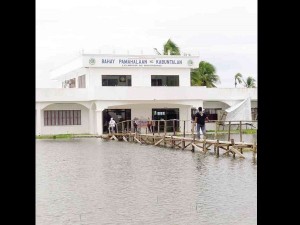Maguindanao massacre victims’ kin turn to United Nations for help

FILE PHOTO
MANILA—Lamenting how the trial has dragged on, relatives of the 58 people slaughtered in the worst case of election-related violence in the country’s history are turning to the United Nations to exact compensation from the government.
More than 100 court hearings have been held since the trial of the Maguindanao massacre, which happened on Nov. 23, 2009, began in early 2010. But the families of the victims feel they are nowhere close to getting justice and due compensation.
While 104 people, including eight principal accused from the Ampatuan clan, have been arraigned, 89 of their co-accused remain at large. And state prosecutors have yet to wrap up the presentation of evidence, private lawyers said.
Given such pace, Noemi Parcon said it may take “16 to 20 years,’’ or well beyond the term of President Aquino before the trial is completed.
“We have no choice but to wait,’’ the 49-year-old widow of one of the 32 murdered journalists said in an interview Thursday afternoon. “We can’t force the government to speed it up.’’
Article continues after this advertisementBut like some of the victims’ relatives, Parcon has started to lose hope they would get justice under Mr. Aquino’s watch. “With such pace, there’s little hope we can get justice within six years.’’
Article continues after this advertisementThey appealed to Justice Secretary Leila de Lima to speed up the prosecution of the accused
On the eve of the fourth anniversary of the massacre Friday, they offered prayers for the victims during a Mass celebrated by Fr. Robert Reyes at the University of the Philippines College of Law in Quezon City.
Erlyn Umpad sobbed as she and the others approached the altar, clutching blown-up pictures of their dead relatives, during the offertory.
“Please guide our son as he grows up,’’ she sobbed, addressing her late husband, UNTV cameraman McDelbert Arriola. She later said she hoped the trial would end soon because she loathed the idea of their son growing old enough to attend the trial.
She said her husband and their then newly born baby spent only more than a dozen days before he met his tragic end.
The family members later filed a communication with the UN Human Rights Committee by emailing it to [email protected] from a laptop in the same room where they heard Mass.
They asked the UN body to persuade the Philippine government to compensate each of them for the deaths of the family “breadwinners’’ in violation of their rights.
“We’ve been rebuffed by the Philippine government, so we decided to go to the UN,’’ said Parcon, widow of Koronadal City-based newsman Joel Parcon.
Their lawyer, Harry Roque, invoked the International Covenant on Civil and Political Rights to demand reparation from the state for violation of the victims’ right to life.
Since the trial of the accused is ongoing, the victims could not demand from the state to provide an “adequate domestic remedy,’’ he said in his office at the UP Law Center on Thursday afternoon.
But given Malacañang’s “unequivocal’’ objection to paying compensation because the crime happened under another President’s watch, the law professor said they were left with no choice but to go to the United Nations human rights body.
“We’re not asking for a figure. Under international law, the figure should be sufficient to extinguish all the consequences of the illegal act,’’ he said. Some of the victims mentioned P2 million.
“If the government could pay Hong Kong nationals who were killed in the 2009 hostage-taking in Luneta, how much more us? They have a bigger responsibility to us,’’ Parcon said. “The President and our lawmakers should try to understand us.’’
Rommel Bagares, co-counsel, said the Philippines is a party to the International Covenant on Civil and Political Rights’ Optional Protocol, which he said provides that any citizen could file a complaint with the UN for violation of his or her right.
There has been a precedent.
Roque, Bagares and the rest of the members of their NGO, Center for International Law have been inspired by the UNHRC’s favorable resolution on the libel case filed against Davao City broadcaster Alex Adonis by then Speaker Prospero Nograles.
The UNHRC said in October 2011 that the Philippine libel laws were incompatible with freedom of expression.
This Saturday, the family members are also filing on-line communications with the UN Special Rapporteurs on the Protection of Freedom of Expression, on Extra-judicial Killings and on Reparations to look into the case of the slain journalists, lawyer Gilbert Andres said.
It may take years before the UNHRC could resolve this, but given the dire straits they’re in, it’s better than nothing, the lawyer said. Some of them were given livelihood start-up money by the Aquino administration years ago but it could only go so far.